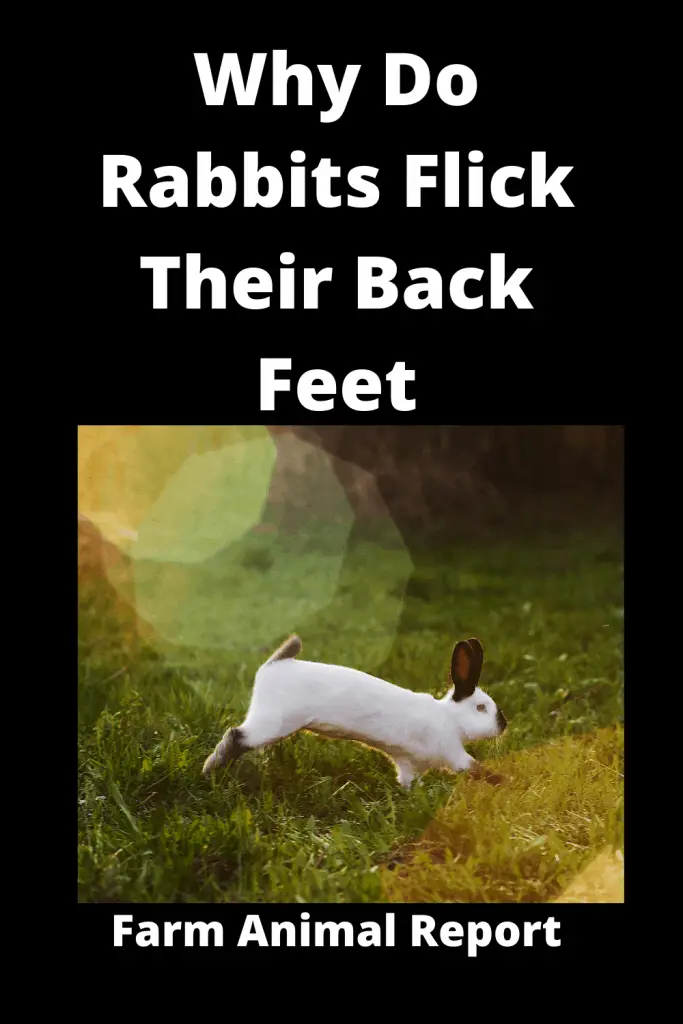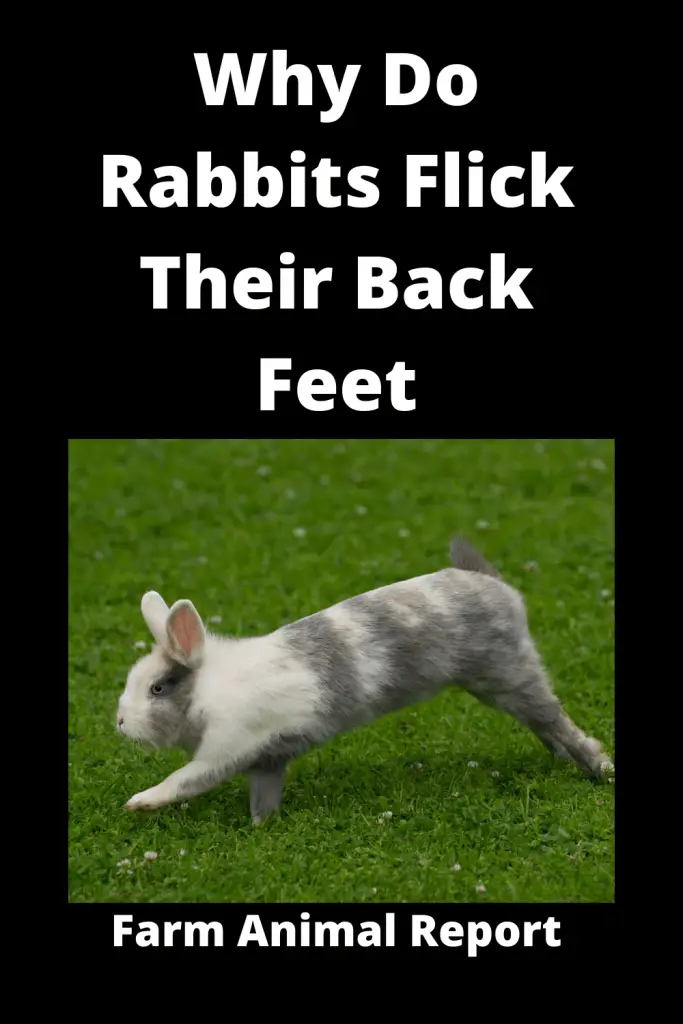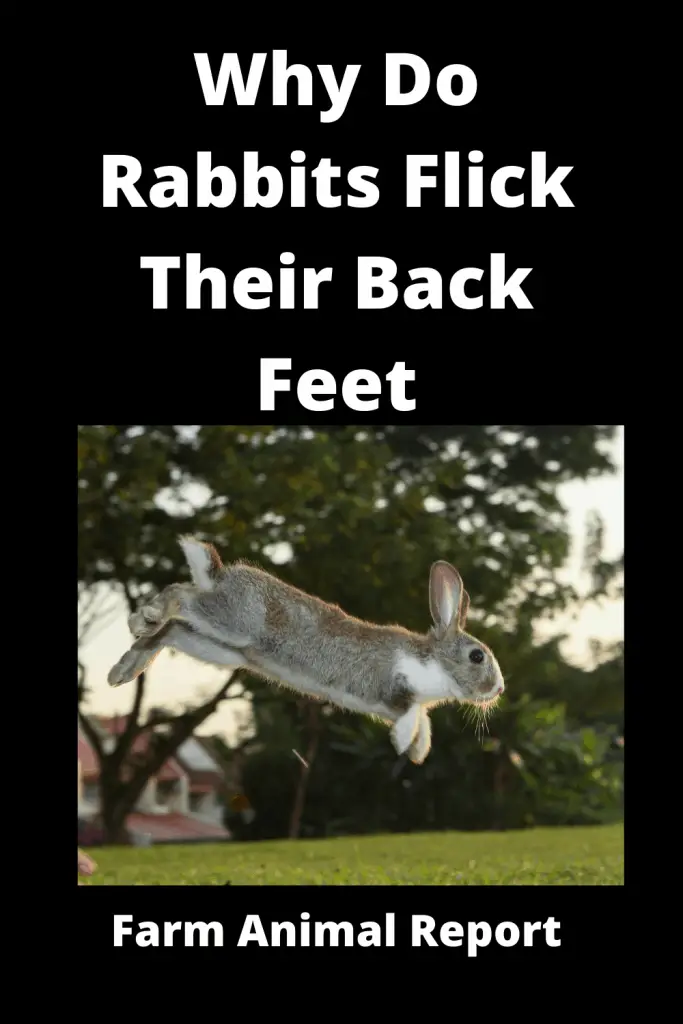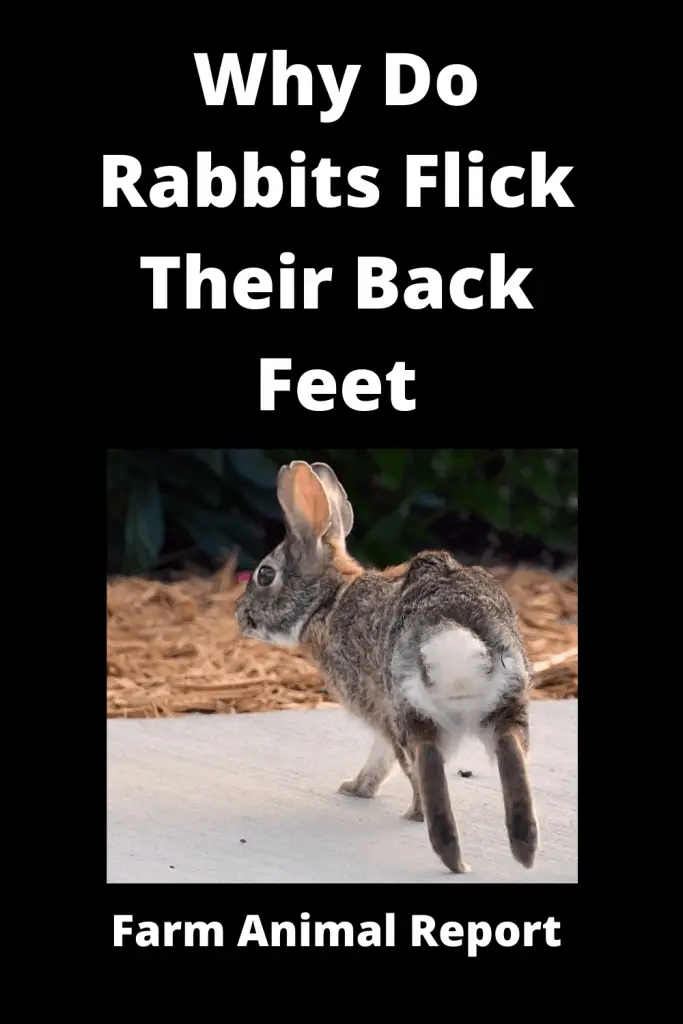As general rule rabbits flick their black feet indicating several possible messages. 1) They are irritated 2) Showing dominance 3) Protecting from predators. Rabbits are known for their powerful back legs, which allow them to move quickly over short distances. However, rabbits can also use their powerful back legs to kick their human companions, causing injury to humans or themselves. They can use that behavior for escape or defense
Why Do Rabbits Flick Their Back Feet
Why Do Rabbits Flick Their Back Feet. Rabbits are known for their powerful back legs, which allow them to move quickly over short distances. However, rabbits can also use their powerful back legs to kick their human companions, causing injury to humans or themselves. They can use that behavior for escape or defense. Flicking in rabbits is a behavior that many rabbit owners observe. Owners should understand that kicking is an indication of how secure a rabbit feels when being held. Proper handling is the best option to help prevent this unwanted behavior.
Why Do Rabbits Flick Their Back Feet / Rabbit Flicking / Rabbit Swearing
What Does My Rabbit’s Behavior Mean?
A rabbit’s body language can be subtle, therefore it’s not always easy to understand how a rabbit’s feeling. A good place to start is with a rabbit’s ears. If they are close together, facing upwards and pointing outwards, the rabbit is likely to be relaxed and happy.
Check Out Amazon for Resources about Breeding Rabbits
Alternatively, a worried rabbit’s ears will be flattened against their back. Other indicators are a rabbit’s eyes and body posture. Additionally, their behavior can indicate how they are feeling, for example, a rabbit may be anxious if they are hiding. Rabbits’ body language can be subtle, meaning that it’s not always obvious how they’re feeling. Use this guide to help you recognize important body language signals.
Rabbit Body Language / Prey Animals
Sometimes, it can be difficult to know what our rabbits are thinking. As prey animals, the way they behave is different from other common pets and changes to their body language can be quite subtle. If you know what to look for, their body language can be a huge giveaway as to how your rabbits are feeling.
It can help you recognize if they are stressed, unhappy, or if they’re just chuffed to be a rabbit. As rabbits often try to hide any signs of illness, their body language can also indicate if there is something wrong with them. Keep an eye out for the signs below. Always take your rabbits to the vet if you notice an unexplained change in their behavior to rule out any illnesses or medical causes.
How Can I Tell if My Rabbits are Happy?
If they’re in the right environment allowing them to express their natural behaviors, with the right company and diet, your rabbits should be happy most of the time unless something is bothering them. There are some clear indicators in your rabbits’ body language which can help you recognize if they are feeling happy:
- Relaxed body. Your rabbits won’t look tense when they are happy. Their bodies will look relaxed and comfortable and they won’t seem on edge. There are lots of ways your rabbit might show they are relaxed, usually when lying down. They might sit with their legs tucked under their bodies (like a little rabbit loaf!), or lie down completely stretched out (superman Pose).
- Curiosity. Rabbits who are hopping around, exploring their environment, and munching are happy bunnies! Even the shyest rabbits are naturally curious and when they feel safe, they’ll want to explore new objects.
- Happy hopping. When your rabbits are happy, you might notice them do a little ‘binky’. This is when they hop in the air, twist a little bit, then land back on the ground.
- Nose twitching. Happy and content rabbits will be constantly wiggling and twitching their noses, whether they’re bouncing about or relaxing.
You can also Read our Guide –18 Ways to Make Money by Rabbit Farming—Extensive Guidelines for Rabbit Farmers

How Can I Tell If My Rabbits are Unhappy?
If your rabbits suddenly stop behaving ‘normally’, or aren’t showing many signs of being happy, then you should first take them to your vet. They will be able to rule out any medical conditions that could cause a change in your rabbits’ behavior. They’ll also be able to chat through your rabbits’ living situation and give you plenty of top tips on how to improve it to make your rabbits happier, even if they don’t find anything medically wrong.
There are lots of signs to look out for in your rabbits to recognize if they are unhappy.

Stress in Rabbits
Rabbits can become worried or anxious if they’re put in a situation they don’t like or if they’re feeling unwell. Signs to look out for include:
- Ears. Your rabbits’ ears are a big giveaway as to how they are feeling. If they flatten their ears tightly against their body, this could mean that they are feeling stressed or anxious.
- Tense and ‘down’ body. Rabbits will usually tense up if they are stressed or worried. They might go into a crouched position, or flatten themselves against the ground – like they’re trying not to be seen, but are also ready to run if they need to. You’ll notice a split-second version of this if your rabbits are startled by a loud noise and freeze, but if they seem immobilized this is a really strong sign, they’re unhappy.
- Lack of nose twitching. If your rabbits look tucked up and quiet with their chins tucked in and noses not twitching this can be a sure sign of them feeling unhappy or stressed, as this is not a normal position for a rabbit.
- Moving or running away. Your rabbits may turn and move away from you (or each other) if they’re unhappy. Sometimes chasing each other is a form of play, but sometimes a rabbit will be trying to get away from the other or from you, so watch for other signs of happiness or unhappiness to judge which it is.
- Hiding. Worried and scared rabbits will hide away a lot. If you notice your rabbits hiding, don’t try to move them. Instead, make sure they have space to come out when they feel ready. Pop a few exciting Toys or their favorite Veggie down to try and coax them out.
- Thumping. Thumping would originally have acted as a warning to other bunnies nearby that there’s danger about. If your rabbits are unhappy or feel threatened by something, they may thump the ground with their back legs and make lots of noise.
Angry and Unhappy Rabbits
Your rabbits will show clear signs if they’re very unhappy and feel threatened enough to become aggressive because they’re so scared or worried. Signs to look out for include:
- Tense and ‘up’ body. Rather than crouching and tensing, like a stressed or worried bunny, your rabbits may tense in a more aggressive stance if they’re unhappy. They might crouch and angle their head up, rather than having it flat against the floor.
- Rabbit turns and moves away flicking the back feet. Ears may be held against the back.
- Boxing. If they are sitting upright and their front paws are ‘boxing’ at you, they are likely very unhappy.
- Vocalizing. Rabbits don’t tend to make much noise and when they do it’s a sign, they’re feeling very threatened. You may hear them grunting or growling and in extreme cases, they can scream.
- Showing their front teeth. If they show you their teeth, this is an extreme sign of fear and a ‘final warning’.

What to Do If My Rabbits are Unhappy
If any of your rabbits are showing signs of stress or unhappiness, there could be a number of reasons for their behavior. If you can clearly see something is causing them to be anxious or unhappy, such as an unfamiliar object or something you are doing, take it away or stop if you can. It’s important to speak to your vet if you notice any changes in your rabbits’ behavior and body language so they can make sure there are no medical reasons for it. They will be able to advise you on the best action to take.

Prevention – To Keep Your Rabbits Happy
The easiest way to make sure your rabbits are happy is to meet their 5 Welfare Needs
- Health. Make sure your rabbits get regular check-ups and Vaccinations to keep them healthy. Keep an eye on their teeth and feed them the right diet to avoid issues, too, as dental problems can be common in rabbits.
- Behavior. Make sure you provide everything your rabbits need to fulfill their natural instincts and behave like bunnies.
- Companionship. Rabbits Should never be kept alone. They are social animals and love having another (neutered) rabbit friend to play with.
- Diet. Make sure you feed your Rabbit the Best Diet to keep them happy and healthy. We would not recommend a muesli type of diet. Their body size of fresh hay every day is really important
- Environment. Providing the perfect home for your bunny can go a long way to keeping them happy. As well as enough space to live in, they need an outdoor run with plenty of space to play and hop.
Rabbit Meat Profitability Table
| Rabbits | Rabbits Born | Lbs Meat / Year | Average Price / LB | Total Revenue Possible |
|---|---|---|---|---|
| 1 | 84 | 252 | $ 8.00 | $ 2016 |
| 2 | 168 | 504 | $ 8.00 | $ 4032 |
| 5 | 420 | 1260 | $ 8.00 | $ 10,080 |
| 10 | 840 | 2520 | $ 8.00 | $ 20,162 |
| 20 | 1680 | 5040 | $ 8.00 | $ 40,320 |
| 30 | 2520 | 7560 | $ 8.00 | $ 60,480 |
| 40 | 3360 | 10,080 | $ 8.00 | $ 80,640 |
| 50 | 4200 | 12,600 | $ 8.00 | $ 100,800 |
| 100 | 8400 | 25,200 | $ 8.00 | $ 201.600 |
| 200 | 16,800 | 50,400 | $ 8.00 | $ 403,200 |
Rabbit Giant Angora Fur Profitability Table
| Rabbits | Rabbits Born / Yr | 0z wool / Year 40 OZ / Rabitt | Average Price / oz $10.00 | Feed Cost / Yr $ .30 per day / $ 110 per Year | Total Revenue Possible |
|---|---|---|---|---|---|
| 1 | 84 | 3,360 | $ 33,600 | $ 9,240 | $ 24,360 |
| 2 | 168 | 6,720 | $ 67,200 | $ 18,480 | $ 48,720 |
| 5 | 420 | 16,800 | $ 168,000 | $ 46,200 | $ 121,800 |
| 10 | 840 | 33,600 | $ 33,6000 | $ 92,400 | $ 243,600 |
| 20 | 1680 | 67,200 | $ 672,000 | $ 184,800 | $ 487,200 |
| 30 | 2520 | 100,800 | $ 1,008,000 | $ 57,200 | $ 950,800 |
| 40 | 3360 | 134,400 | $ 1,344,000 | $ 369,600 | $ 974,400 |
| 50 | 4200 | 168,000 | $ 1,680,000 | $ 462,000 | $ 1,218,000 |
| 100 | 8400 | 336,000 | $ 3,360,000 | $ 924,000 | $ 2,436,000 |
| 200 | 16,800 | 672,000 | $ 6,720,000 | $ 1,848,000 | $ 4,872,000 |
Average Giant Angora Weight 10lb
40 Oz shaved Fur per Rabbit per Year
Feed $ .30 per day for 10lb Rabbit
Rabbit Poop Profitability Table
| Number Rabbits | Manure / day / .5lb | Manure / lbs Week | Manure /lbs Year | |
|---|---|---|---|---|
| 1 | .5 | 3.5 | 182 | |
| 2 | 1 | 7 | 364 | |
| 3 | 1.5 | 10.5 | 546 | |
| 4 | 2 | 14 | 728 | |
| 5 | 2.5 | 17.5 | 910 | |
| 10 | 5 | 35 | 1820 | |
| 20 | 10 | 70 | 3640 | |
| 30 | 15 | 105 | 5460 | |
| 40 | 20 | 140 | 7280 | |
| 50 | 25 | 175 | 9100 | |
| 100 | 50 | 350 | 18,200 | |
| 200 | 100 | 700 | 36,400 | |
Breeds of Rabbits FAQ
| Breed of Rabbit | Origin | Weight | Purpose | Kits / Litter | Breed association |
|---|---|---|---|---|---|
| New Zealands | California | 5 kg 11 lbs | Meat | 8 | American Federation New Zealand Rabbit Breeders Assoc |
| Californias | California | 3 kg 7-10 lbs | Meat | 6 - 8 | California Rabbit Breeders |
| Rex | France | 4.5 kg 10.5 lbs | Meat | 2 - 4 | National Rex Rabbit Club |
| Satins | Michigan | 4 kg 9.5 lbs | Meat | 2 - 4 | American satin Breeders Association |
| Paliminos | American | 5.4 kg 12 lbs | Meat | 6 -8 | Palimino Rabbit Breeders Association |
| English Angora | England | 2-3 kg 5-7 lbs | Wool | 6 - 8 | National Angora Breeders |
| French Angora | France | 4.5 kg 10.5 lbs | Wool | 6 - 8 | National Angora Breeders |
| Giant Angora | Turkey | 4.5 kg 9 - 10 lbs | Wool | 6 - 8 | National Angora Breeders |
| Satin Angora | Turkey | 4.5 kg 6 - 10 lbs | Wool | 6 - 8 | National Angora Breeders |
| Mini Lop | UK | 3 kg 5.5 lbs | Dwarf | 2 -3 | American Mini Lop Rabbit Club |
| Dutch Dwarf | Netherlands | 1 - 2 kg 2,5 lbs | Dwarf | 2 - 4 | American Netherland Dwarf Rabbit Club |
| Pygmy Rabbit | North American | 500 grams 1 lb | Dwarf | 6 | ? |
| Britania Petite | UK / Polish | 700 grams 1 1/2 - 2 lbs | Dwarf | 2-3 | American Britiania Petite Rabbit Society |
Size
Purpose
Litter Size
Breed Association
Rabbit Breeder Associations
| Rabbit Association | Location | Link |
|---|---|---|
| American Breeders Association | United States | ARBA |
| House Rabbit Society | California | HRS |
| Ohio States Rabbit Breeders Association | Ohio | OSRBA |
| Livestock Conservancy | North Carolina | LC |
| Rabbit Welfare Association and Fund | United Kingdom | RWA |
| British Rabbit Council | United Kingdom | BRC |
| European Association of Rabbits.... | Europe | EAP |
| Australian National Rabbit Council | Australia | ANRC |
| Australian Rabbit House Society | Australia | ARHS |
| ARBA - Rabbit Shows | United States | ARBA - Shows |





